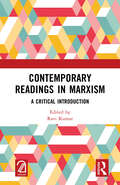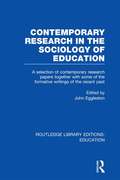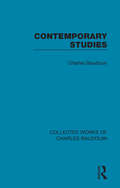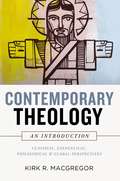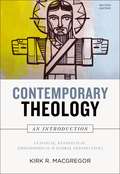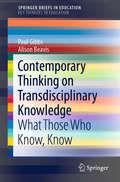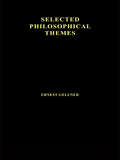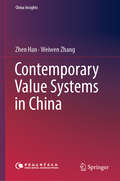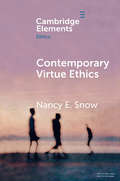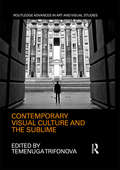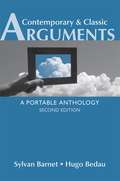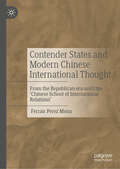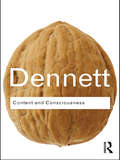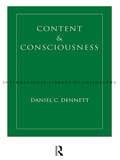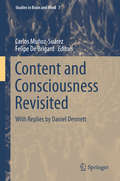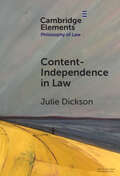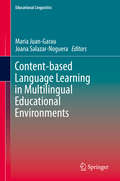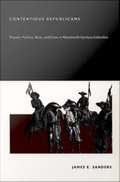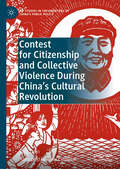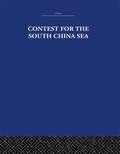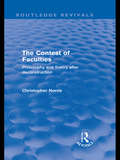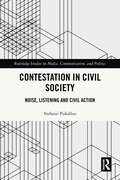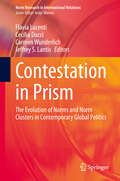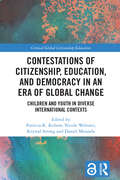- Table View
- List View
Contemporary Readings in Marxism: A Critical Introduction
by Ravi KumarThis volume straddles between being a compilation of chapters exploring the fundamental conceptual categories within Marxism while engaging with those categories at the same time demonstrating the dynamic ability of the Marxian theoretical paradigm to evolve. Challenging the misinterpretation of Marxian theory as rigid, deterministic and outdated it shows how the concepts used by the framework become relevant tools for understanding and analysing society. Divided across two parts the volume grounds the Marxian concepts in a concrete historico-material context of India. It will be an important source for any student interested in social theory in general and Marxism in particular.
Contemporary Research in the Sociology of Education (Routledge Library Editions: Education)
by John EgglestonThe subject matter of this book – what happens in schools, the effects of curriculum change, the reasons why some children are successful and others are not – explains just why the sociology of education is one of the most important areas to achieve political importance. There are five sections to the book covering: Educational Achievement; Educational Provision; The Organization of the School; Roles in the School and Values and Learning. The editor discusses the implications of the material presented (much of which was available for the first time when this book was originally published).
Contemporary Studies (Collected Works of Charles Baudouin)
by Charles BaudouinOriginally published in 1924, this title is divided into four parts, each looking at contemporary issues. Beginning with ‘The Liberators of the Mind’, the author discusses important thinkers of the time, such as Tolstoy and Nietzsche. The second part looks at ‘The War and the Peace’, which refers to the recently fought First World War. He then moves on to ‘Education and Society’, where discussions include Bahaism and Father Christmas. The final part looks at ‘Art and Criticism’, discussing the trends of French post-war poetry – realism, symbolism and dynamism – followed by a look at dynamic drawing. This volume is available again after many years out of print.
Contemporary Theology: Classical, Evangelical, Philosophical, and Global Perspectives
by Kirk R. MacGregorAccessible and comprehensive, Contemporary Theology: An Introduction by professor and author Kirk R. MacGregor provides a chronological survey of the major thinkers and schools of thought in modern theology in a manner that is both approachable and intriguing.Unique among introductions to contemporary theology, MacGregor includes:Evangelical perspectives alongside mainline and liberal developmentsThe influence of philosophy and the recent Christian philosophical renaissance on theologyGlobal contributionsRecent developments in exegetical theologyThe implications of theological shifts on ethics and church lifeContemporary Theology: An Introduction is noteworthy for making complex thought understandable and for tracing the landscape of modern theology in a well-organized and easy-to-follow manner.
Contemporary Theology: Classical, Evangelical, Philosophical, and Global Perspectives
by Kirk R. MacGregorAccessible and comprehensive, Contemporary Theology: An Introduction by professor and author Kirk R. MacGregor provides a chronological survey of the major thinkers and schools of thought in modern theology in a manner that is both approachable and intriguing.Unique among introductions to contemporary theology, MacGregor includes:Evangelical perspectives alongside mainline and liberal developmentsThe influence of philosophy and the recent Christian philosophical renaissance on theologyGlobal contributionsRecent developments in exegetical theologyThe implications of theological shifts on ethics and church lifeContemporary Theology: An Introduction is noteworthy for making complex thought understandable and for tracing the landscape of modern theology in a well-organized and easy-to-follow manner.
Contemporary Thinking on Transdisciplinary Knowledge: What Those Who Know, Know (SpringerBriefs in Education)
by Paul Gibbs Alison BeavisHow can we understand what a transdisciplinary (TD) approach might actually comprise of, given its complex and various uses? This book asks the question of leading practitioners in the field of higher education and transdisciplinarity. The emergence of transdisciplinarity has been a response to the often-failed closed-system, discipline-based approaches to solving complex social problems (various reports and definitions may be found in projects reported by the OECD, UNESCO and EU). These failures are often contingent upon disaggregated notions of epistemology and the compounding failures of ontological incongruities that are evident in these discipline-based approaches. Such approaches are not necessarily confined to large, seemingly insurmountable social problems, but apply equally well to issues in educational institutions as workplaces. Transdisciplinary knowledge is in the liberation of new and imaginative understanding of the structured reality of open social systems. It gives rise to generative mechanisms, which are central to relationships of agency and structure.
Contemporary Thought and Politics
by Ernest GellnerGellner's political philosophy in these volumes combines the down-to-earth realism of political sociology with a rational treatment of the normative issues of traditional political thought. In these essays Gellner strives to understand the religions of nationalism, communism and democracy, returning again and again to the basic values of the liberal: social tolerance, rational criticism, human decency and justice.
Contemporary Value Systems in China (China Insights)
by Zhen Han Weiwen ZhangThis work illustrates China’s values and how they are practiced. After introducing readers to the theories, systematical structure, historical status, and influence of traditional Chinese values, it points out major developmental trends in connection with modernization. Further, it explores the significance of the contemporary reconstruction of Chinese values and argues that these values can be divided into three layers: values-based goals of national development, Chinese values concepts, and norms of values in a civil society. On this basis, it subsequently interprets the core socialist values “Prosperity, Democracy, Civility and Harmony,” the value concepts “Freedom, Equality, Justice and Rule of Law” and values-based norms “Patriotism, Dedication, Integrity and Friendship.”
Contemporary Virtue Ethics (Elements in Ethics)
by Nancy E. SnowThis Element provides an overview of the central components of recent work in virtue ethics. The first section explores central themes in neo-Aristotelian virtue ethics, while the second turns the discussion to major alternative theoretical perspectives. The third section focuses on two challenges to virtue ethics. The first challenge is the self-centeredness or egoism objection, which is the notion that certain kinds of virtue ethics are inadequate because they advocate a focus on the person's own virtue and flourishing at the expense of, or at least without due regard for, the concerns of others. The second is situationist challenges to the ideas that there are indeed virtues and that personality is integrated enough to support virtues.
Contemporary Visual Culture and the Sublime (Routledge Advances in Art and Visual Studies)
by Temenuga TrifonovaIn the course of its long and tumultuous history the sublime has alternated between spatial and temporal definitions, from its conceptualization in terms of the grandeur and infinity of Nature (spatial), to its postmodern redefinition as an "event" (temporal), from its conceptualization in terms of our failure to "cognitively map" the decentered global network of capital or the rhizomatic structure of the postmetropolis (spatial), to its neurophenomenological redefinition in terms of the new temporality of presence produced by network/real time (temporal). This volume explores the place of the sublime in contemporary culture and the aesthetic, cultural, and political values coded in it. It offers a map of the contemporary sublime in terms of the limits—cinematic, cognitive, neurophysiological, technological, or environmental—of representation.
Contemporary and Classic Arguments: A Portable Anthology
by Sylvan Barnet Hugo BedauModelling an extensive range of argumentative writing at half the price, the concise Contemporary & Classic Arguments helps you engage with some of today's most pressing topics through a collection of classic essays that provide time-tested models of effective argument.
Contender States and Modern Chinese International Thought: From the Republican era until the ‘Chinese School of International Relations’
by Ferran Perez MenaThis book contends that the development of modern Chinese international thought has been profoundly shaped by the distinctive nature of the Chinese state as a contender state and its global positioning since 1912. The argument posited demonstrates that, notwithstanding the varied perspectives on the 'international' held by Chinese intellectuals throughout the 20th century, there exist commonalities across the periods analyzed in this book. In essence, the book emphasizes that the shared elements influencing the production of modern Chinese international thought do not derive from a unified cultural Chinese identity but rather stem from China's evolving geopolitical position in the modern world.
Content and Consciousness
by Daniel C. DennettContent and Consciousness is an original and ground-breaking attempt to elucidate a problem integral to the history of Western philosophical thought: the relationship of the mind and body. In this formative work, Dennett sought to develop a theory of the human mind and consciousness based on new and challenging advances in the field that came to be known as cognitive science. This important and illuminating work is widely-regarded as the book from which all of Dennett’s future ideas developed. It is his first explosive rebuttal of Cartesian dualism and one of the founding texts of philosophy of mind.
Content and Consciousness (International Library of Philosophy)
by Daniel C. DennettFirst published in 2002. Routledge is an imprint of Taylor & Francis, an informa company.
Content and Consciousness Revisited: With Replies by Daniel Dennett (Studies in Brain and Mind #7)
by Carlos Muñoz-Suárez Felipe De BrigardWhat are the grounds for the distinction between the mental and the physical? What is it the relation between ascribing mental states to an organism and understanding its behavior? Are animals and complex systems vehicles of inner evolutionary environments? Is there a difference between personal and sub-personal level processes in the brain? Answers to these and other questions were developed in Daniel Dennett's first book, Content and Consciousness (1969), where he sketched a unified theoretical framework for views that are now considered foundational in cognitive science and philosophy of mind. Content and Consciousness Revisited is devoted to reconsider the ideas and ideals introduced in Dennett's seminal book, by covering its fundamental concepts, hypotheses and approaches and taking into account the findings and progress which have taken place during more than four decades. This book includes original and critical contributions about the relations between science and philosophy, the personal/sub-personal level distinction, intelligence, learning, intentionality, rationality, propositional attitudes, among other issues of scientific and philosophical interest. Each chapter embraces an updated approach to several disciplines, like cognitive science, cognitive psychology, philosophy of mind and cognitive psychiatry.
Content-Independence in Law: Possibility and Potential (Elements in Philosophy of Law)
by Julie DicksonThis Element examines the notion of content-independence and its relevance for understanding various aspects of the character of law. Its task should be understood expansively, as encompassing both inquiry into that which makes law into what it is, and inquiry into what law ought to be, which values it ought to serve, and which aspects of its character may play a facilitative role in law realising aspects of its potential. Many existing discussions of content-independence focus largely on the justificatory aspects of content-independence: whether, and, if so, how, there can be content-independent reasons for action, or content-independent justifications of rules, or the extent to which political obligation is content-independent. This Element, too, examines such issues but also seeks to explore an additional possibility: that the notion of content-independence can illuminate issues regarding law's existence, identification, and systematicity.
Content-based Language Learning in Multilingual Educational Environments (Educational Linguistics #23)
by Maria Juan-Garau Joana Salazar-NogueraThe spread of English as an international language along with the desire to maintain local languages lead us to consider multilingualism as the norm rather than the exception. Consequently, bi/multilingual education has bloomed over the last decades. This volume deals with one such type of education currently in the spotlight as an essentially European strategy to multilingualism, CLIL (Content and Language Integrated Learning), in which curricular content is taught through a foreign language. The book contributes new empirical evidence on its effects on linguistic and attitudinal outcomes focusing on bi/multilingual learners who acquire English as an additional language. Moreover, it presents critical analyses of factors influencing multilingual education, the effects of CLIL on both language and content learning, and the contrast between CLIL and other models of instruction. The research presented suggests that CLIL can greatly enhance language acquisition in multilingual settings.
Contentious Republicans: Popular Politics, Race, and Class in Nineteenth-Century Colombia
by James E. SandersContentious Republicans explores the mid-nineteenth-century rise of mass electoral democracy in the southwestern region of Colombia, a country many assume has never had a meaningful democracy of any sort. James E. Sanders describes a surprisingly rich republicanism characterized by legal rights and popular participation, and he explains how this vibrant political culture was created largely by competing subaltern groups seeking to claim their rights as citizens and their place in the political sphere. Moving beyond the many studies of nineteenth-century nation building that focus on one segment of society, Contentious Republicans examines the political activism of three distinct social and racial groups: Afro-Colombians, Indians, and white peasant migrants. Beginning in the late 1840s, subaltern groups entered the political arena to forge alliances, both temporary and enduring, with the elite Liberal and Conservative Parties. In the process, each group formed its own political discourses and reframed republicanism to suit its distinct needs. These popular liberals and popular conservatives bargained for the parties' support and deployed a broad repertoire of political actions, including voting, demonstrations, petitions, strikes, boycotts, and armed struggle. By the 1880s, though, many wealthy Colombians of both parties blamed popular political engagement for social disorder and economic failure, and they successfully restricted lower-class participation in politics. Sanders suggests that these reactionary developments contributed to the violence and unrest afflicting modern Colombia. Yet in illuminating the country's legacy of participatory politics in the nineteenth century, he shows that the current situation is neither inevitable nor eternal.
Contest Theory: Incentive Mechanisms and Ranking Methods
by Milan VojnoviContests are prevalent in many areas, including sports, rent seeking, patent races, innovation inducement, labor markets, scientific projects, crowdsourcing and other online services, and allocation of computer system resources.<P><P> This book provides unified, comprehensive coverage of contest theory as developed in economics, computer science, and statistics, with a focus on online services applications, allowing professionals, researchers and students to learn about the underlying theoretical principles and to test them in practice. The book sets contest design in a game-theoretic framework that can be used to model a wide-range of problems and efficiency measures such as total and individual output and social welfare, and offers insight into how the structure of prizes relates to desired contest design objectives. Methods for rating the skills and ranking of players are presented, as are proportional allocation and similar allocation mechanisms, simultaneous contests, sharing utility of productive activities, sequential contests, and tournaments.
Contest for Citizenship and Collective Violence During China’s Cultural Revolution (IPP Studies in the Frontiers of China’s Public Policy)
by Yang LijunThis book has been groundbreaking for scholars of the Cultural Revolution, but hitherto was only available in Japanese and Chinese. This edition allows English-language readers to access the work for the first time. The author explains how political struggles within the state, competing sectarian interests, and other complex factors intertwined to produce various forms of collective violence that had a major impact on the political, economic, and social order of the time.
Contest for the South China Sea
by Marwyn SamuelsFirst published in 1982. Wide-ranging and fully documented, this book is the first detailed study of the origins, contexts and consequences of the long-standing dispute between China, Taiwan, Vietnam and the Philippines over the Paracel and Spratly Archipelagos in the South China Sea - one of the world's most strategically important inter-ocean basins and China's southern maritime frontier. Samuels' analysis: * Highlights the impact of the shifting balance of power in Asia and the growing competition for oceanic resources * Examines the implications of the dispute in terms of the historical and modern role of china as a maritime power in Asia.
Contest of Faculties: Philosophy and Theory after Deconstruction (Routledge Revivals)
by Christopher NorrisThis Routledge Revival, first published in 1985, gives detailed attention to the bearing of literary theory on questions of truth, meaning and reference. On the one hand, deconstruction brings a vigilant awareness of the figural and narrative tropes that make up the discourse of philosophic reason. On the other it insists that argumentative rigour cannot be divorced from the kind of close reading that has come to characterize literary theory in its more advanced or speculative forms. This present-day ‘contest of faculties’ has large implications for philosophers and critics, many of whom will welcome the reissue of such a clear-headed statement of the impact of deconstruction.
Contestation in Civil Society: Noise, Listening and Civil Action (Routledge Studies in Media, Communication, and Politics)
by Stefanie PukallusContestation in Civil Society looks at the dynamic relationship between noise, listening and civil action as the key to understanding how societies communicatively make decisions about their internal and external boundaries.By focusing on the three components of noise, listening and civil action, the book moves attention away from an exclusive focus on what is being communicated – the communicator, the statement, the speech and so on. It argues that what is being communicated – the noise – does not lead in and of itself to civil action but rather that the audience – the listeners – plays a crucial role in determining what the noise means, whether it is judged legitimate or not and whether any civil action should be taken.Exploring how the relationship between noise, listening and civil action plays out within the context of contestation will interest academics and scholars of political studies, political philosophy, communication, sociology, media and cultural studies.
Contestation in Prism: The Evolution of Norms and Norm Clusters in Contemporary Global Politics (Norm Research in International Relations)
by Jeffrey S. Lantis Carmen Wunderlich Flavia Lucenti Cecilia DucciThis book analyses the complex dynamics of international norm contestation and explores how norms adapt and withstand challenges in different settings. Examining the interplay between various types of contestation, norm robustness, and the resilience of norm clusters, it sheds light on what the authors define as ‘contestation in prism’. The book thus presents norm contestation as a multifaceted process with far-reaching implications. In this context, it further discusses different conceptions of contestation, ranging from reactive vs. proactive contestation and applicatory vs. validity contestation, to inadvertent, i.e. interpretive vs. deliberate contestation. It then develops a theoretical model that links contestation ‘in prism’ with studies of norm clusters, or norms that are embedded in broader normative structures and interwoven with other normative meanings. Based on a strong theoretical framing, the book presents in-depth analyses of norm contestation in areas such as regional organizations, nuclear non-proliferation, norms relating to atrocities, and international criminal law. Offering multifaceted perspectives on norm evolutions and their implications, this contribution will appeal to students, scholars, and researchers of international relations and related disciplines, as well as policy-makers interested in a better understanding of contestation and norm cluster resiliency.
Contestations of Citizenship, Education, and Democracy in an Era of Global Change: Children and Youth in Diverse International Contexts (Critical Global Citizenship Education)
by Daniel Miranda Patricia K. Kubow Nicole Webster Krystal StrongContestations of Citizenship, Education, and Democracy in an Era of Global Change: Children and Youth in Diverse International Contexts considers the shifting social, political, economic, and educational structures shaping contemporary experiences, understandings, and practices of citizenship among children and youth in diverse international contexts. As such, this edited volume examines the meaning of citizenship in an era defined by monumental global change. Chapters from across both the Global South and Global North consider emerging formations of citizenship and citizen identities among children and youth in formal and non-formal education contexts, as well as the social and civic imaginaries and practices to which children and youth engage, both in and outside of schools. Rich empirical contributions from an international team of contributors call attention to the social, political, economic, and educational structures shaping the ways young people view citizenship and highlight the social and political agency of children and youth amidst increasing issues of polarization, climate change, conflict, migration, extremism, and authoritarianism. The volume ultimately identifies emergent forms of citizenship developing in formal and non-formal educational contexts, including those that unsettle the nation-state and democracy. Edited by a team of academics with backgrounds in education, citizenship, and youth studies, this book will appeal to scholars, researchers, and faculty who work across the broader field of youth civic engagement and democracy, well as international and comparative education and citizenship.
